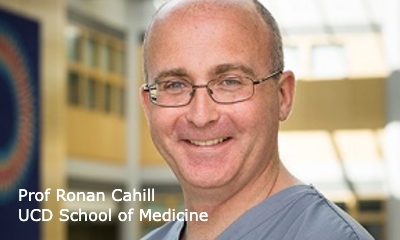 A study published today in Nature Scientific Reports, shows how dynamic visual appearances obtainable during surgery, using innovative digital processing, can provide more comprehensive information on the extent and type of malignant tissue, especially in colon-rectal cancer, to surgeons in moments. This discovery has the potential to exploit already established microscopic principles in medical oncology and histopathology but applies principles which have never before been revealed and understood in real-time in living tissue.
A study published today in Nature Scientific Reports, shows how dynamic visual appearances obtainable during surgery, using innovative digital processing, can provide more comprehensive information on the extent and type of malignant tissue, especially in colon-rectal cancer, to surgeons in moments. This discovery has the potential to exploit already established microscopic principles in medical oncology and histopathology but applies principles which have never before been revealed and understood in real-time in living tissue.
Previously, there were considerable time frames to have formal characterisation of tissue types performed by laboratories or to understand responsiveness to medical therapies by interval radiological imaging. In contrast, this method allows a surgeon to ‘see’ the cancerous tissue not just by its gross appearance but by its behaviour and distinguish it clearly from nearby normal tissue. This discovery also has the potential to open up a new field for diagnosis and curative treatment and to radically improve health outcomes.
In summary the 'Digital dynamic discrimination of primary colorectal cancer using systemic indocyanine green with near-infrared endoscopy' study as published in Nature Scientific Reports shows that:
- Application of digital visualisation technology with discriminant, safe dyes can exploit angiogenesis (development of new blood vessels) and other hallmark cancer processes to determine malignant tissue nature in real-time, in living tissue
- Surgeons will be enabled to implement individualised endoscopic and keyhole therapies to treat cancer in these patients
- By combining basic research with clinical translation simultaneously, this new AI method is being brought to patients sooner and with less risk of failure versus the traditional 'bench to bedside' approach.
Speaking about this discovery, Ronan Cahill, Professor of Surgery at UCD Centre for Precision Surgery and the Mater Misericordiae University Hospital (MMUH) and Nature Scientific Report paper author said: "Dynamic digital discrimination of cancer right at the time of intervention means the surgical team can better perfect the right intervention to the individual patient first time. The tools we are developing are straightforward to deploy and use software to allow users easily interpret the findings without having to develop further specialist knowledge. If cancer can be fully detected, it’s much more likely to be cured in one single operation or have combination therapies better sequenced and so the risk to the patient of recurrence and complications are markedly reduced.
"Traditional research means insights developed in academic labs subsequently need considerable additional development to make ready for in-human trialling, often these mean completely new technology and care processes have to be created and many discoveries fail to make any useful contribution despite early excitement and a lot of work and investment. By working within a leading clinical care centre and building the research entirely around patients and their care by assembling a team of interdisciplinary experts, we have been able to safely accelerate and apply the research in the clinic, meaning current cancer care needs are perfectly matched. By collaborating early and closely with excellent industry partners, we minimise the many uncertainties that beset the path to patient usefulness."
Also speaking about this discovery, Jeffrey Dalli, General Surgeon, Surgical Research Fellow at UCD Centre for Precision Surgery and Lead Author of today’s paper in Nature Scientific Reports said: "Colon and rectal cancers are common, being the second most common major cancer type in men and women and they are increasing in incidence especially among younger people. Alongside the projected increased incidence of early-stage colorectal cancer which is already curable by surgery, advances in treatment mean more patients with advanced disease are increasingly also able to be cured by including surgery again after initial chemotherapy or radiotherapy. Together, these facts have expediated interest in perfecting methods for surgeons to define exactly the nature and extent of malignant deposits at the time of intervention so that both the maximum amount of disease can be removed (to maximise cure) with a minimum of normal surrounding tissue (to minimise functional incapacity). The technology will help surgeons better discriminate during operations exactly what is best for each individual patient."
This research is funded by a Disruptive Technologies Innovation Fund (DTIF) 2018, provided by the Irish Government via Enterprise Ireland.
This DTIF also supports the 'The Future of Colorectal Cancer Diagnosis and Treatment' Consortium comprising UCD, RCSI, IBM Research and Deciphex. An open UCD-IBM Colloquium event titled 'Innovation Ecosystems in Digital Surgery' is scheduled for Thurs 10 June. REGISTER HERE.
For further information
- Visit UCD CENTRE FOR PRECISION SURGERY
- See https://cuttingedgeblog.com/2021/05/21/guest-blog-21st-century-surgery-is-digital/